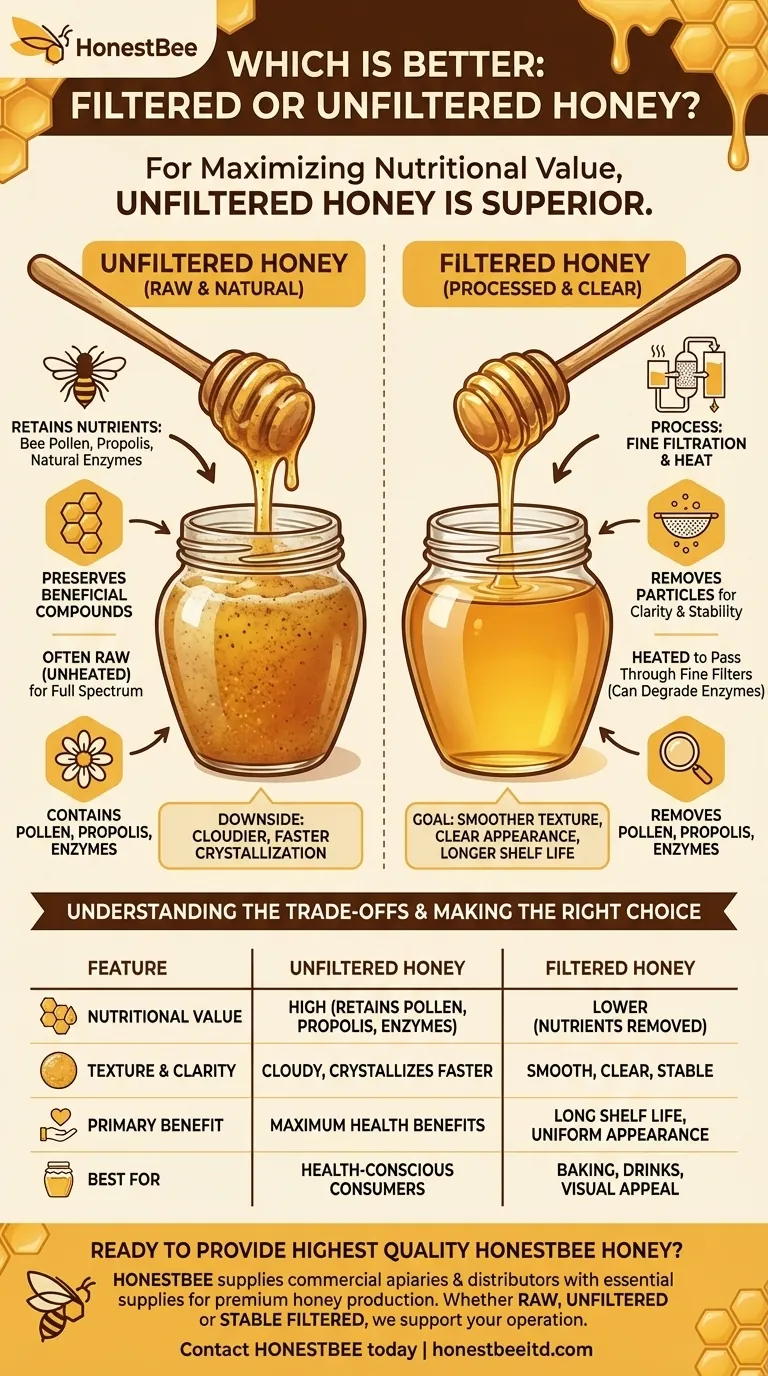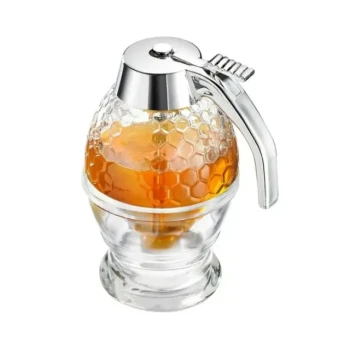For maximizing nutritional value, unfiltered honey is superior. It retains beneficial components like bee pollen, propolis, and natural enzymes that are removed during commercial filtration. While filtered honey offers a smoother texture and clearer appearance, this comes at the cost of these health-promoting compounds.
The choice between filtered and unfiltered honey is a trade-off. Unfiltered honey preserves the full spectrum of natural compounds from the hive, while filtered honey is processed for a consistent appearance and longer shelf life at the expense of nutritional density.

What "Filtered Honey" Actually Means
To make an informed choice, you must first understand why and how honey is filtered. The term itself can describe different levels of processing.
The Goal of Filtering: Clarity and Stability
The primary driver for commercial filtration is consumer expectation. Most shoppers are accustomed to honey that is a clear, golden liquid.
Filtering removes small particles like pollen, wax, and propolis. This not only creates a clearer product but also significantly slows down the natural process of crystallization, extending the honey's liquid state on the shelf.
Straining vs. Fine Filtration
There is a critical distinction between basic straining and the fine filtration used in large-scale production.
Virtually all honey, including "unfiltered" honey, is strained to remove large debris like bee parts and wax chunks. However, commercial fine filtration uses microscopic filters to remove even the smallest particles, including nutrient-rich pollen.
The Role of Heat in Processing
To pass through these fine filters, thick honey must be gently heated to lower its viscosity. This heat, even if minimal, can degrade or destroy the delicate natural enzymes that are a key benefit of raw honey.
The Nutritional Difference: What's Lost in the Filter?
The main argument for unfiltered honey centers on the valuable microscopic components that the filtration process is designed to remove.
Bee Pollen
Bee pollen is a nutritionally rich substance containing vitamins, minerals, amino acids, and powerful antioxidants. Many of the specific health benefits attributed to honey are linked directly to the presence of pollen, which is almost entirely removed by fine filtration.
Propolis
Often called "bee glue," propolis is a resinous compound bees produce to seal the hive. It is well-regarded for its natural antimicrobial and anti-inflammatory properties. Unfiltered honey contains small amounts of this beneficial substance.
Natural Enzymes and Antioxidants
Raw, unfiltered honey contains enzymes like diastase and invertase, which are introduced by bees. These enzymes can aid in digestion and are indicators of high-quality, unheated honey. Filtration, and the gentle heat that accompanies it, can reduce the presence of both these enzymes and other protective antioxidants.
Understanding the Trade-offs
Neither product is inherently "bad," but they serve different purposes. Understanding the compromises is key to choosing the right one for you.
Why Producers Filter Honey
Producers filter honey to meet market demand for a product that is uniform, clear, and resistant to crystallizing. It creates a predictable and stable product that many consumers prefer for its clean appearance and smooth texture.
The "Downside" of Unfiltered Honey
Unfiltered honey is often cloudier and will crystallize much faster than its filtered counterpart. This grainy texture is a natural process and not a sign of spoilage, but some users find it less desirable for spreading or mixing into drinks.
A Note on "Raw" Honey
The terms "raw" and "unfiltered" are often used together but are not identical. Raw specifically means the honey has not been heated or pasteurized, preserving its enzymes. Unfiltered means the pollen has not been removed. For maximum benefit, you should look for honey that is both raw and unfiltered.
Making the Right Choice for Your Goal
Your decision should be based on your personal priorities for health, taste, and convenience.
- If your primary focus is maximum nutritional benefit: Choose a honey labeled "raw and unfiltered" to ensure you get the full spectrum of pollen, propolis, and natural enzymes.
- If your primary focus is a smooth texture for baking or drinks: A lightly strained or gently filtered honey offers a practical compromise, though with fewer nutritional compounds.
- If your primary focus is long-term liquid stability and clarity: Standard commercial filtered honey is designed to meet this need, but be aware that it lacks the key components found in unfiltered versions.
Ultimately, understanding the journey from the hive to the jar empowers you to choose the honey that best aligns with your health and culinary goals.
Summary Table:
| Feature | Unfiltered Honey | Filtered Honey |
|---|---|---|
| Nutritional Value | High (retains pollen, propolis, enzymes) | Lower (nutrients removed) |
| Texture & Clarity | Cloudy, crystallizes faster | Smooth, clear, stable |
| Primary Benefit | Maximum health benefits | Long shelf life, uniform appearance |
| Best For | Health-conscious consumers | Baking, drinks, visual appeal |
Ready to provide your customers with the highest quality honey?
HONESTBEE supplies commercial apiaries and beekeeping equipment distributors with the essential supplies needed to produce premium, nutrient-rich honey. Whether your focus is on raw, unfiltered honey or a more stable filtered product, we have the equipment to support your operation.
Contact HONESTBEE today to discuss your wholesale needs and elevate your beekeeping products.
Visual Guide

Related Products
- 0.5T Capacity Honey Dehumidifier Dryer with Vacuum Heating and Thickening Filtering Machine
- Economy Honey Homogenizer Mixer and Melting Machine for Beekeeping
- 2 Frame Stainless Steel Manual Honey Spinner Extractor for Beekeeping
- HONESTBEE 72 Frame Industrial Electric Honey Extractor for Beekeeping
- 10L Stainless Steel Electric Honey Press Machine
People Also Ask
- What was the process for drying lumber for beehive supers? Achieve 8-9% Moisture for Precision Joint Stability
- Why is the use of dry sieves and storage containers critical? Prevent Honey Fermentation and Spoilage
- What are some methods to prevent fermentation in high-moisture honey? Protect Your Honey's Quality and Value
- What are the processing advantages of using industrial dehumidification equipment for high-moisture tropical honey?
- How does the internal ventilation management of a beehive affect the efficiency of honey dehydration?



















